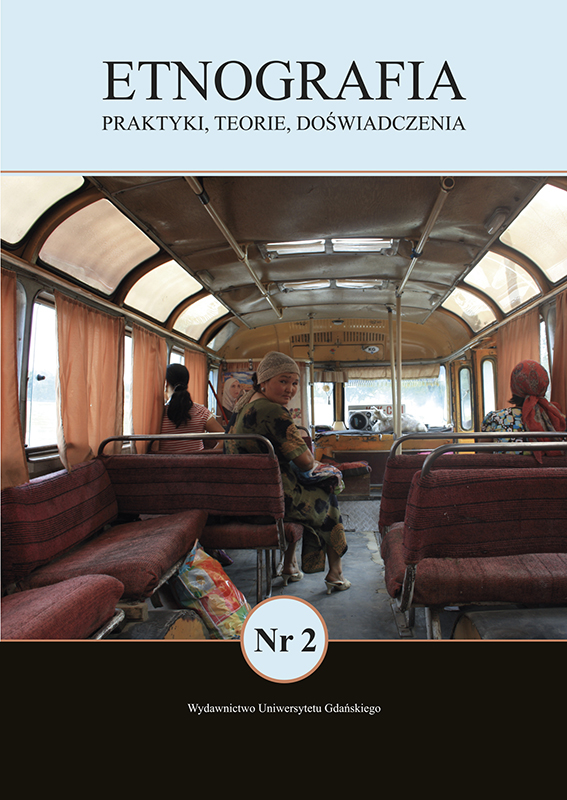Faith, hope, authority: Healing practices in Eastern Podolia region
DOI:
https://doi.org/10.4467/254395379EPT.16.002.6481Keywords:
healers, complementary medicine, folk, medicine, healing practices, medical pluralism, state, UkraineAbstract
The article describes the practices of people using complementary medicine and alternative methods of healing in a Ukrainian village of Murafa and the city of Vinnytsa, both situated in historical Eastern Podolia. I analyse the figure of healer and also attempt to scrutinise local complementary medicine market. In my analisys I use the concept of bricolage and combining practices based on discourses of science, folk, traditions, and spirituality. I also examine the ways in which healers use practices usually related to institutions such as the church or state in order to make sense of their work. The example of state and its institutions serves as an illustration of an object deconstructed in common consciousness, but still generating subliminal attachement to its manifestations; similary I try to look at the question of complementary medicine and healers acting in this field. I conclude my reflections analysing the embodied experience of change that seems to be essential in a successful process of healing.
Downloads
References
Bazylevych, M. (2009). Who is responsible for our health? Changing concepts of state and the individual in post-soviet Ukrainę. Anihropology of East Europę Review, 27(1), 65-75.
Becker, G. (2004). Phenomenology of health and illness. W: C.R. Ernber, M. Ernber (eds.), Encyclopedia of medical anihropology. Health and illness in the world's cultures (pp. 125-136). New York: Springer Science & Business Media.
Bourdieu, P., Wacąuant, L. (2001). Zaproszenie do socjologii refleksyjnej. Przeł. A. Sawisz. Warszawa: Oficyna Naukowa.
Buchowski, M. (1993). Magia i rytuał. Warszawa: Wydawnictwo Instytutu Kultury.
Cassirer, E. (2003). Nazywanie. Przeł. E. Staniewska. W: G. Godlewski, A. Mencel, R. Sulima (red.), Antropologia słowa. Zagadnienia i wybór tekstów (s. 279-282). Warszawa: Wydawnictwa Uniwersytetu Warszawskiego.
Csordas, T. (1988). Elements of charismatic persuasion and healing. Medicał Anihropology Quarterlyr 2(2), 121-142.
Dow Jnr, T. (1978). An analysis of Weber's work on charisma. The British Journal ofSocio-logy, 29(1), 83-93.
Engebretson, J. (1994). Folk healing and biomedicine: culture clash or complimentary approach? Journal of Holistic Nursing, 12(3), 240-250.
Friedland, W. (1964). For a sociological concept of charisma. Social Forces, 43(1), 18-26.
Grębecka, Z. (2006). Słowo magiczne poddane technologii. Kraków: Nomos.
Hali, D. (2007). New Age w Polsce. Lokalny wymiar globalnego zjawiska. Warszawa: Wydawnictwa Akademickie i Profesjonalne.
Kleinman, A. (1980). Patients and Healers in the Context of Culture: An Exploration ofthe Borderland between Anihropology, Medicine, and Psychiatry. London: University of Califor-nia Press.
Leeuw van der, G. (2003). Słowo święte i uświęcające. Przeł. Jerzy Prokopiuk. W: G. Godlewski, A. Mencel, R. Sulima (red.), Antropologia słowa. Zagadnienia i wybór tekstów (s. 325-331). Warszawa: Wydawnictwo UW.
Levi-Strauss, C. (1969). Myśl nieoswojona. Przeł. Andrzej Zajączkowski. Warszawa: Wydawnictwo Naukowe PWN.
Libera, Z. (2003). Znachor w tradycjach ludowych i popularnych XIX-XX wieku. Wrocław: Ossolineum.
Lindąuist, G. (2006). Conjuring hope. Healing and magie in contemporary Russia. New York--Oxford: Berghahn Books.
Merleau-Ponty, M. (2001).Fenomenologia percepcji. Przeł. M. Kowalska, J. Migański. Warszawa: Aletheia.
Musiatewicz, J. (2003). Święte słowa i „biotoki". Eklektyczny charakter lecznictwa ludowego. W: Ł. Smyrski, M. Zowczak (red.), Podole i Wołyń. Szkice etnograficzne (s. 175-188). Warszawa: DiG.
Navaro-Yashin, Y. (2002). Faces of the state: secularism and public life in Turkey. Princeton: Princeton University Press.
Paluch, A. (1995). Etnologiczny atlas ciała ludzkiego i chorób. Wrocław: Wydawnictwo UWr.
Penkala-Gawęcka, D. (2006). Medycyna komplementarna w Kazachstanie. Silą tradycji i presja globalizacji. Poznań: Wydawnictwo Naukowe UAM.
Penkala-Gawęcka, D. (1995). Medycyna ludowa i komplementarna w polskich badaniach etnologicznych. Lud, 78,169-191.
Skalnik, P. (1999). Authority versus power. A view from sociological anthropology. In: A. Cheater (red.), The anthropology of power. Empowerment and disempowerment in chang-ing structures (pp. 163-174). London: Psychology Press.
Taussig, M. (1992). The Nervous System. New York: Routledge.
Wigzell, F. (2009). Traditional magie or European occultism? Commercial fortune-telling and magie in post-Soviet Russia and their relationship to Russian tradition. Folklorica, 14, 57-90
Źródła internetowe:
http://ukrainian.su/istoriya-vinnitskoy-oblasti/vinnitskaya-oblast-vo-vremena-sssr.html [dostęp: 25.01.2016].
http://www.ukrcensus.gov.ua/ [dostęp: 25.01.2016].
Downloads
Published
How to Cite
Issue
Section
License
Czasopismo wydawane jest na licencji Creative Commons Uznanie autorstwa-Na tych samych warunkach 4.0 Międzynarodowe.

 Academic Scientific Journals
Academic Scientific Journals








